|
|
|
Sort Order |
|
|
|
Items / Page
|
|
|
|
|
|
|
| Srl | Item |
| 1 |
ID:
134072
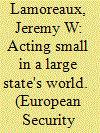

|
|
|
|
|
| Publication |
2014.
|
| Summary/Abstract |
The interest in small states ebbs and flows as important international affairs include small states. Russia's actions and policies vis-à-vis Ukraine, and the resultant intensified apprehension among Russia's smaller neighbours, aim the proverbial microscope at the size and power discrepancies between states. Russia, by most metrics, is a large state and the Baltic states, by those same metrics, are small states. Small-state scholars expect large and small states to act differently. However, the case of Russia and the Baltic states indicates that large and small states do not, in fact, act all that different. This being the case, this article calls into question many of the assumptions made by small-state scholars about the difference between large- and small-state action and argues for changes within small-state studies as a subdiscipline of the larger international relations discipline.
|
|
|
|
|
|
|
|
|
|
|
|
|
|
|
|
| 2 |
ID:
134074
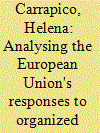

|
|
|
|
|
| Publication |
2014.
|
| Summary/Abstract |
In the past 30 years, organized crime (OC) has shifted from being an issue of little, or no concern, to being considered one of the key security threats facing the European Union (EU), the economic and political fabric of its society and its citizens. The purpose of this article is to understand how OC has come to be understood as one of the major security threats in the EU, by applying different lenses of Securitization Theory (ST). More specifically, the research question guiding this article is whether applying different ST approaches can lead us to draw differing conclusions as to whether OC has been successfully securitized in the EU. Building on the recent literature that argues that this theoretical framework has branched out into different approaches, this article wishes to contrast two alternative views of how a security problem comes into being, in order to verify whether different approaches can lead to diverging conclusions regarding the same phenomenon. The purpose of this exercise is to contribute to the further development of ST by pointing out that the choice in approach bears direct consequences on reaching a conclusion regarding the successful character of a securitization process. Starting from a reflection on ST, the article proceeds with applying a "linguistic approach" to the case study, which it then contrasts with a "sociological approach". The article proposes that although the application of a "linguistic approach" seems to indicate that OC has become securitized in the EU, it also overlooks a number of elements, which the "sociological approach" renders visible and which lead us to refute the initial conclusion.
|
|
|
|
|
|
|
|
|
|
|
|
|
|
|
|
| 3 |
ID:
134066
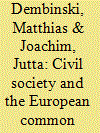

|
|
|
|
|
| Publication |
2014.
|
| Summary/Abstract |
The involvement of civil society organizations (CSOs) is widely regarded by students of the EU's domestic policy fields as enhancing transparency and accountability and, more generally, the democratic quality of political processes. This article explores the contribution of CSOs to the EU's Common Security and Defence Policy and assesses whether a democracy-enhancing effect of their involvement can also be demonstrated for this policy field. We analyse the contribution of CSOs based on two common models of democracy: the intergovernmental and the supranational model of democracy. We find that CSOs are indeed quite actively involved in the EU's security policy. With regard to their democracy-enhancing effects, however, our findings are rather mixed. While the engagement of CSOs does provide a remedy for the democratic deficits associated with intergovernmental decision-making, these organizations do not fully meet the demands posed by supranational governance.
|
|
|
|
|
|
|
|
|
|
|
|
|
|
|
|
| 4 |
ID:
134068
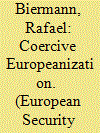

|
|
|
|
|
| Publication |
2014.
|
| Summary/Abstract |
Secessionism is still the predominant conflict type in Europe. Even though the European Union (EU) extended the enlargement perspective to the Balkans 15 years ago, secessionist ambition remains pervasive, especially in Bosnia, Kosovo, Macedonia and Serbia. How does secessionism affect Europeanization and how does Europeanization affect secessionism? It is argued here that in cases of unattained statehood domestic power struggles among deeply divided elites over status and territorial control undermine the consensus needed for Europeanization. In cases of attained de facto statehood the conflict focuses on recognition, which likewise polarizes societies and marginalizes reform. In such high-resistance scenarios, where the inclusionary EU norms clash with the exclusionary norms of the secessionists, the EU vigorously works to marginalize the secessionists by relying mainly on denial, punishment and imposition. Still, the EU's leverage is often insufficient in moving the conflicting parties towards within-state solutions and reform. A study of Bosnia's transformation since Dayton reveals, however, that the EU's leverage varies over time and that the EU at times itself inadvertently fans secessionism.
|
|
|
|
|
|
|
|
|
|
|
|
|
|
|
|
| 5 |
ID:
134073
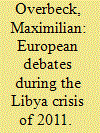

|
|
|
|
|
| Publication |
2014.
|
| Summary/Abstract |
The war in Libya of 2011 is generally portrayed as yet more evidence of the European Union (EU)'s inability to formulate a coordinated foreign policy. While the crisis took place in the EU's backyard, joint foreign policy action was hindered by member states' disagreements on whether or not to establish a no-fly zone in Libya. While this is true of political decision-makers, this paper investigates whether governmental decisions were reflected in similar divisions in national news media or whether references to European identity and criticism of European disunity transcended national media boundaries. Comparing a total of 6746 newspaper articles from Germany, France, the UK, Austria and the USA, the findings show that intergovernmental differences did not lead to similarly divided public spheres. Public debates in France, Germany and Austria constantly referred to a European foreign policy identity, though EU identity references were largely absent from UK newspapers.
|
|
|
|
|
|
|
|
|
|
|
|
|
|
|
|
| 6 |
ID:
134064
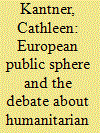

|
|
|
|
|
| Publication |
2014.
|
| Summary/Abstract |
Studies on the democratic control and legitimacy of Common Security and Defence Policy (CSDP) have thus far mostly focused on formal institutions. However, a comprehensive analysis requires including the 'sociocultural infrastructure' in which such formal institutions are embedded. Students of democracy have argued that the public sphere is a crucial dimension, if not a precondition for all mechanisms of democratic control in general. This paper investigates whether and in which ways Europeans participated in transnational European communication on humanitarian military interventions (1990-2005/2006). The paper analyzes a full sample of 108,677 newspaper articles published in leading newspapers of six EU member states, and the US as a comparative case. It demonstrates that the 'national' arenas of political communication are intertwined and allow ordinary citizens to make up their minds about common European issues in the highly controversial and normatively sensitive realm of humanitarian military interventions.
|
|
|
|
|
|
|
|
|
|
|
|
|
|
|
|
| 7 |
ID:
134063
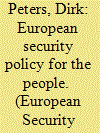

|
|
|
|
|
| Publication |
2014.
|
| Summary/Abstract |
The democratic foundations of European integration in the foreign and defence realm are increasingly being debated. This article looks at the question of democratic legitimacy from one particular angle, by examining public opinion as measured in Eurobarometer surveys between 1989 and 2009. Based on reflections about the relation between polling results and wider questions of democracy, it examines three aspects of public opinion: general support for a common foreign and a common defence policy; differences among support rates in EU member states; and what roles Europeans would prefer for European armed forces. It turns out that general support for a common foreign policy is high, whereas the desirability of a common defence policy is much more contested. Moreover, citizens across Europe would prefer European armed forces to take on traditional tasks, as territorial defence. An EU defence policy that goes beyond strict intergovernmentalism and is directed towards protecting international law and universal human rights would thus require a significant communicative effort to become accepted.
|
|
|
|
|
|
|
|
|
|
|
|
|
|
|
|
| 8 |
ID:
134062
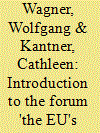

|
|
|
|
|
| Publication |
2014.
|
| Summary/Abstract |
The democratic control and legitimacy of the Common Security and Defence Policy (CSDP) has received growing attention. However, thus far, studies have mostly focused on 'blue prints', i.e., the analysis of formal powers of formal institutions, especially the European Parliament. These studies leave two desiderata that the contributions to this forum aim at overcoming: Firstly, in-depth case studies are required on how formal institutions make actual use of their formal powers in CSDP. Secondly, an examination of the 'sociocultural infrastructure' in which formal institutions and decision-making processes are embedded is required. The contributions to this forum redress both deficits. First, the actual practices of parliamentary involvement in the case of the EU's first maritime mission 'Atalanta' are examined. Second, the most important dimensions of the 'sociocultural infrastructure' are empirically studied, namely public opinion, the public sphere and civil society.
|
|
|
|
|
|
|
|
|
|
|
|
|
|
|
|
| 9 |
ID:
134071
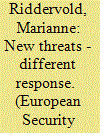

|
|
|
|
|
| Publication |
2014.
|
| Summary/Abstract |
When the European Union (EU) launched its first military naval mission, EU NAVFOR Somalia, Atalanta, the states who are members of both the EU and the North Atlantic Treaty Organization (NATO) made a political choice: to prioritize the EU over NATO in their multilateral military efforts to fight piracy and its consequences. Thereby, Atalanta challenges the conventional assumption that EU security cooperation will remain limited. It also challenges the widely held belief that the European states will chose to act through NATO if dealing multilaterally with international security issues. How can we explain this decision? This analysis suggests that it can be explained in two phases where different mechanisms were at work. In the first phase, which can be accounted for from a neo-realist perspective, France, who held the Presidency, used particular favorable geopolitical conditions to put an autonomous EU operation on the agenda. However, agreement on the EU option cannot be explained as a result of strategic bargaining. Instead, in a second phase and in line with an alternative hypothesis building on the theory of communicative action, the EU member states came to support the French suggestion due to legitimacy considerations regarding the legal framework of the two operations
|
|
|
|
|
|
|
|
|
|
|
|
|
|
|
|
| 10 |
ID:
134065
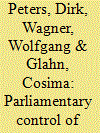

|
|
|
|
|
| Publication |
2014.
|
| Summary/Abstract |
Parliamentary involvement remains a key tool for the democratic control of executive policies. This article explores the web of parliamentary involvement in decision-making on European Union (EU) military operations, using insights gained in an in-depth case study on the EU's anti-piracy mission Atalanta. We find that parliaments at all levels became involved only after key political decisions had already been made. At the member state level, we find highly uneven involvement with only some parliaments being very well informed and closely monitoring, if not influencing government policy. The European Parliament became active only after the launch of the mission but then scrutinised it intensely, profiting (in contrast to national parliaments) from its access to top military officials and key decision-makers. Finally, transnational parliamentary assemblies as well as more informal networks provided opportunities to transmit information across the boundaries of individual parliaments and party-groups thus potentially enhancing the ability of parliamentarians to scrutinise government policies.
|
|
|
|
|
|
|
|
|
|
|
|
|
|
|
|
| 11 |
ID:
134067
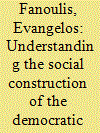

|
|
|
|
|
| Publication |
2014.
|
| Summary/Abstract |
Drawing upon the Foucauldian approach of governmentality, this article argues that the democratic deficit of the EU's Common Security and Defence Policy (CSDP) is the outcome of how governmental power flows in CSDP governance and more precisely within the governance practices of the policy. To support this argument, the narrative explores the secrecy/confidentiality, informality and normalisation of the exercise of governmental power in a concrete example of CSDP governance, the recent pooling and sharing initiative. The example shows that the official makers of CSDP pursue efficiency of governance to the detriment of the democratic quality of the policy, and this is related with the productive and expansive rationality of governmental power flowing in and between the EU institutions. Despite the fact that governmentality usually links to structural explanations, allowing limited space for the role of agency in politics, the article concludes with reflections on how the political agency of the governing EU political subjects contributes to the social construction of the democratic deficit of CSDP.
|
|
|
|
|
|
|
|
|
|
|
|
|
|
|
|
| 12 |
ID:
134070
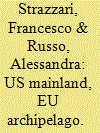

|
|
|
|
|
| Publication |
2014.
|
| Summary/Abstract |
The fight against organized crime has become a top security priority for the European Union (EU). While a new policy area is emerging, it is difficult to understand who is in lead and how the process develops. This article delves into the post-Lisbon EU security model, exploring how Washington and Brussels collaborate in combating organized crime in a context of changing definitions, actors and policies. It argues that US definitions, operational models and policies influence EU institutional thinking and policies, shifting the emphasis from prevention and rule of law to execution and intelligence. The dynamics of policy convergence and divergence on criminal matters in the transatlantic community reflect tectonic shifts in the deepest levels of thinking security in the West, affecting the moulding of a European security identity.
|
|
|
|
|
|
|
|
|
|
|
|
|
|
|
|
| 13 |
ID:
134069
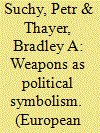

|
|
|
|
|
| Publication |
2014.
|
| Summary/Abstract |
This study evaluates the role of tactical nuclear weapons (TNWs) for NATO today. Historically, TNWs fulfill five objectives. First, they provide a deterrent by denial capability. Second, TNWs serve to deter TNWs by other countries. Third, as the most 'useable' of nuclear weapons, they offer militaries solutions to a small target set of hardened targets. Fourth, they bridge the interface between nuclear and conventional forces, maintaining linkage up the ladder of escalation. Fifth, they serve as a powerful political symbol of an extended deterrent commitment. While the perception is that their utility for NATO in plausible European contingencies is low, we argue that there is variation in the political and military roles of TNWs. We submit that, in general, the first role has lost its significance but the other objectives remain relevant to NATO's present political circumstances, especially as a symbol of the transatlantic relationship and as a safeguard against Russian belligerence. Accordingly, TNWs remain a significant part of NATO's capabilities and should remain deployed in Europe.
|
|
|
|
|
|
|
|
|
|
|
|
|
|
|
|
|
|
|
|
|